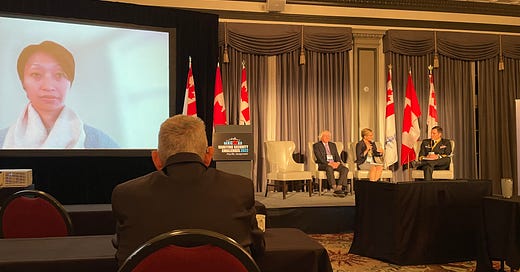The Maritime Security Challenges 2022 meeting of more than 160 attendees from around the globe began with a panel on the security context this morning, unsurprisingly since one must understand that aspect before delving into much else. The context centers around China today, with some discussion (particularly on the second panel) about Russia’s role today. As I listen to the bells chime 4 p.m. here in Victoria, I must ask yet again whether we in the United States grasp that we have to set and meet priorities rather than jumble everything together. What exactly is our primary objective with regard to China and how would we describe a successful conclusion to this competition? In other words, how do we really spell out what we want?
Evidence to me over the past decade indicates that the United States continues to articulate weakly what we want out of our relationship with the Indo-Asia Pacific; we continue to stress what we don’t want which is for China to seize the leadership which the United States has held in this region for more than three quarters of the last century. We stress the instruments we like to use in trying to keep China from becoming more powerful (establishing military relationships with allies and partners, increasing trade with states which are overwhelmingly trading with China these days, incentivising states to turn away from China’s authoritarianism and potentially strangling embrace as just three instruments we mention repeatedly). But this is not really an articulation of how we think we can get to an endstate we want. Instruments by themselves are not a whole. The instruments may contradict one another, in fact.
Other states seem to have a somewhat easier time: they want to protect their sovereignty (a condition where they decide how to act in policy at home or abroad). Part of what is easy for our friends and potential partners is that each of them has a far more narrow role which allows a decidedly more clearly articulated objective for them. Washington’s goals are broad and seem truly incompassing which is not true for Delhi, Seoul, Canberra, Singapore or Tokyo. Interestingly, the idea of vast aspirations are one of Washington’s complaint about Beijing’s behaviour.
The United States rarely discusses protecting our sovereignty because we don’t see it as threatened that often. We fear China will threaten our sovereignty with a greater role in the international decision-making but that is quite different from the conditions most of the world faces regularly as militarily powerful countries can (and does) ignore what other states say when it suits our purposes.
We began using the term ‘Free and Open Indo-Asia Pacific’ several years back to provide a desired endstate. It’s a catchy term with a good deal of appeal. It also most certainly allows us to believe China, with its preference for draconian ppunishment against those who oppose the CCP’s will cannot offer a comparably desirable model as the basis for friendship between states. Beijing uses any and all instruments to thwart or disciipline another country from choicing positions China dislikes; when South Korean chose to deploy a THAAD system several years ago, Beijing even used tourism to punish Seoul to sress their disapproval on anything they find so threatening Cynthia Watson, 'The CCP and Pursuing Its Goals: Proliferating Non-traditional Aspects of Power' . Former Secretary of State Mike Pompeo is probably the single most prominent voice condemning China’s communist ideology as the greatest threat to the region (and the world); the CCP ideology is the opposite of freedom and cannot be allowed to exist. 'Mike Pompeo: We have to confront China in every dimension', 14 November 2022 Pompeo is again articulating what we don’t want rather than stressing how the free and open concept would benefit all. He doesn’t talk about what a free and open Indo-Pacific would mean in practice.
Part of the problem is that other countries think we too seek constrain their choices. Our responses do not tend to be as harsh as Beijing’s but others see us intervening in what these states see as their sovereign rights to decide various policies. For the United States penalizes regimes we see as anti-democratic rather than allowing them to sort out their form of governance.
That is absolutely fine for advancing our desired outcome of seeing the spread of our values around the world if we recognise this undermines support for our broader interests of preventing these states from cosying up to Beijing. In large portions of the former ‘Third World’ or developing world where democracy is yet to take hold, our stress on democracy is not welcome. Instead those non-democratic elements tend to welcome Beijing’s aid, attention, and support rather than surrender their political power in the face of U.S. pressure. States with non-elected leaders most often got those rulers by themselves, without any help from China whatsoever; it turns out that lots of regimes do not want to surrender the reigns of power to the will of the people.
I support democracy as the best form of the government because I believe it is such. But I also believe that we need recognise that our insistence on how other sovereign states govern themselves leaves open the door for China to present them with better deals, as they see it, than we do. Our discussion at the conference today about the Solomon Islands was a reminder of this.
The global context shows us that we have to choose whether we want to keep China out of some of these places by holding our nose to tolerate non-elected leaders or to stand on the principles of stressing the centrality of democracy as a tenet of our culture and our national interests. It would appear we cannot always have both simultaneously. I hope I am wrong. FIN




